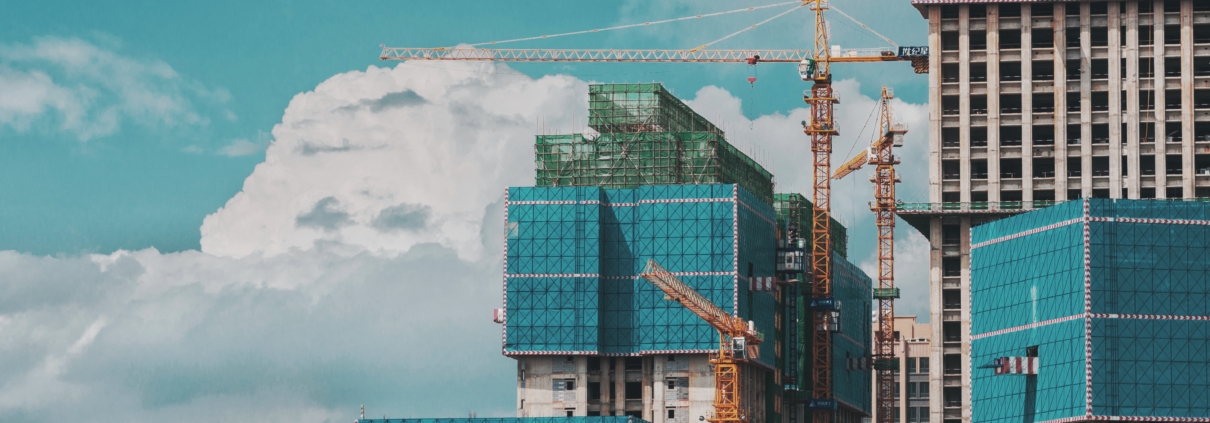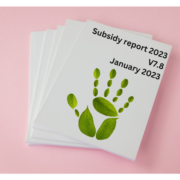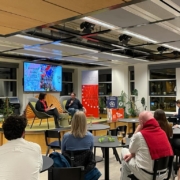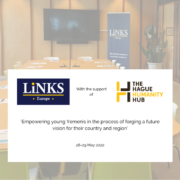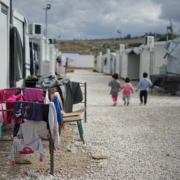What’s the relationship between businesses and human rights? And what should it be? We spoke to Dr. Virginie Rouas, Researcher at the T.M.C Asser Institute about supply chains, duties of care, and how respecting human rights includes going green
By Thomas Ansell
If you were asked to imagine or to name something that infringes upon human rights, you’re quite likely to think of a state actor, non-state group, or someone with a leading position in a government. And, whilst human rights are trampled upon by various regimes around the world, we often forget the importance of businesses in building a world that respects human rights and dignity. But considering the impact that businesses large and small have on the world, and the people within it, more attention should be focused on how money is made, resources extracted and refined, and trade is kept running.
Luckily, the T.M.C Asser Institute, a globally-recognised legal research centre based in The Hague (and a Humanity Hub member) has a research stream on ‘Transnational Public Interests: Constituting Public Interest Beyond and Below the State’. Researchers in this stream look into, amongst other things, how non-state actors affect public interests, including human rights. Dr. Virginie Rouas, a Researcher in this stream, is not only an expert in business and Human Rights but has also worked on sustainability from a legal perspective.
So, why do businesses need to care about Human Rights?
“Businesses, first of all, can have an impact on virtually the entire spectrum of Human Rights “, says Virginie, “and business-related human rights abuses are particularly acute in the context of activities or large multinational corporations or in global value chains.” Added to this, says Virginie, there are recurrent human rights violations in sectors such as textiles, agriculture, and mining. “As for why they should care, they cannot ignore human rights violations any more: a growing number of stakeholders are requesting that companies look into their human rights impact [and] lawsuits are increasingly being filed against companies… that can pose important financial and reputational risks”
Then, says Virginie, we should look at the power that some companies hold. “Large multinational corporations have acquired significant economic power in recent decades, and can thus wield considerable leverage [on their suppliers, for instance] to prevent human rights violations.”
And what sort of rules exist at the moment to hold businesses to account?
Whilst there is no binding set of rules on this, Virginie says, “in 2011 the UN Human Rights Council unanimously endorsed the UN Guiding Principles on Human Rights (UNGPs)… a global standard of expected conduct for all business enterprises wherever they operate. These principles are independent of states’ own requirements.” And though not legally binding, these principles set out a global standard and have been used as a “reference standard in legislative developments”, says Virginie. She adds that the UNGPs were referenced in the Mileudefensie et al. vs Royal Dutch Shell plc climate case that gained headlines around the world last year.
How can a business ensure its compliance? And do they need to look at their entire supply chain?
“Businesses can, for example, conduct a Human Rights Due Diligence (HRDD) assessment”, says Virginie, and there’s guidance in conducting one of these in the UNGPs. To summarise:
- businesses should identify and assess actual human rights violations and potential human rights violations with which they may be directly or indirectly involved (GP 18).
- Once they have identified human rights risks, they should take appropriate action to prevent and mitigate human rights violations (GP 19).
- Businesses should also track the effectiveness of their response to verify whether human rights violations are being addressed (GP 20) and communicate externally how they address their human rights impacts (GP 21).
“The Guiding Principles also include [in GP22] the provision for a company to provide for or cooperate in their remediation through legitimate processes”, says Virginie. In fact, she adds, there is a universal element to respecting human rights within businesses and supply chains: with GP 14 stating that companies should work in a human rights-sensitive way ‘regardless of their size, sector, operational context, ownership, and structure’.
“And, whilst businesses should conduct a HRDD across their entire global value chain, the UNGPs recognise that doing so may be ‘unreasonably difficult’ for business with a large number of entities in their supply chains”, says Virginie.
What responsibilities do companies have? And do they have a specific ‘Duty of Care’?
This is an active and ongoing debate, says Virginie. “At the moment, no legally binding obligation exists under international human rights law for companies to respect human rights”, added to this, says Virginie, company law principles often stop companies from being held liable for abuses committed by their subsidiaries or suppliers. However, very recent developments might point to a change here, with Virginie pointing to a recent case in the UK that may set a precedent.
“With the adoption of the UNGPs, there is the recognition that businesses have a responsibility to respect human rights. Several countries have passed or are in the process of passing legislation imposing mandatory due diligence obligations. France was the first country to do in 2017. It allows NGOs to put a company on notice to comply with its obligations, and any victim can also claim damages. Since 2019, the first mechanism has already been used more than 16 times”, says Virginie, “and companies have been accused of failing to meet their due diligence obligations in various areas, including labour rights violations, plastic pollution, deforestation… Several proceedings are currently pending against oil and banking companies for insufficient consideration of their climate risks.” And France isn’t the only country, she adds, “other countries, including Germany and Norway, have followed France’s lead, and a directive imposing human rights and environmental due diligence obligations is currently being negotiated at EU level.”
How can we ensure that a company doesn’t simply change the country it is based in to avoid legislation?
Whilst this can’t be entirely prevented, says Virginie, there are various regional efforts to combat this sort of behaviour. “One example is the upcoming EU directive on corporate sustainability due diligence. Furthermore, a UN-sponsored international treaty on business and human rights is currently being negotiated. In addition, a similar treaty for the African continent may be negotiated soon.” And, what complicated the matter further, is that “companies sometimes have to operate in countries with less stringent social or environmental legislation because, for example, the resources that they need are in those countries – like certain metals needed for the green transition.”
And finally, how can Human Rights Due Diligence legislation be used to help stop widescale climate damage?
Whilst Virginie highlights that there is potential for using these frameworks to hold irresponsible business practices around climate to account, including a landmark case in France (and a recent UN Information Note by a working group on climate, human rights, and business), “we are still in the early stages of implementing such strategies, and it remains to be seen whether the growing use of a human rights lens in the climate context will produce successful results in the long run.” As Virginie says, it’s important to bring together academics, stakeholders, government, and practitioners together to find a common framework together, and some academics are putting in groundwork to prepare for this: “I believe it is critical to develop a due diligence concept that is tailored to the multifaceted characteristics and challenges posed by climate change, which will necessitate a reflection that extends beyond human rights issues alone.”
For more information about Dr. Rouas’ work, check out her profile page on the T.M.C Asser Institute website. Our thanks to her assistance in putting together this piece!

